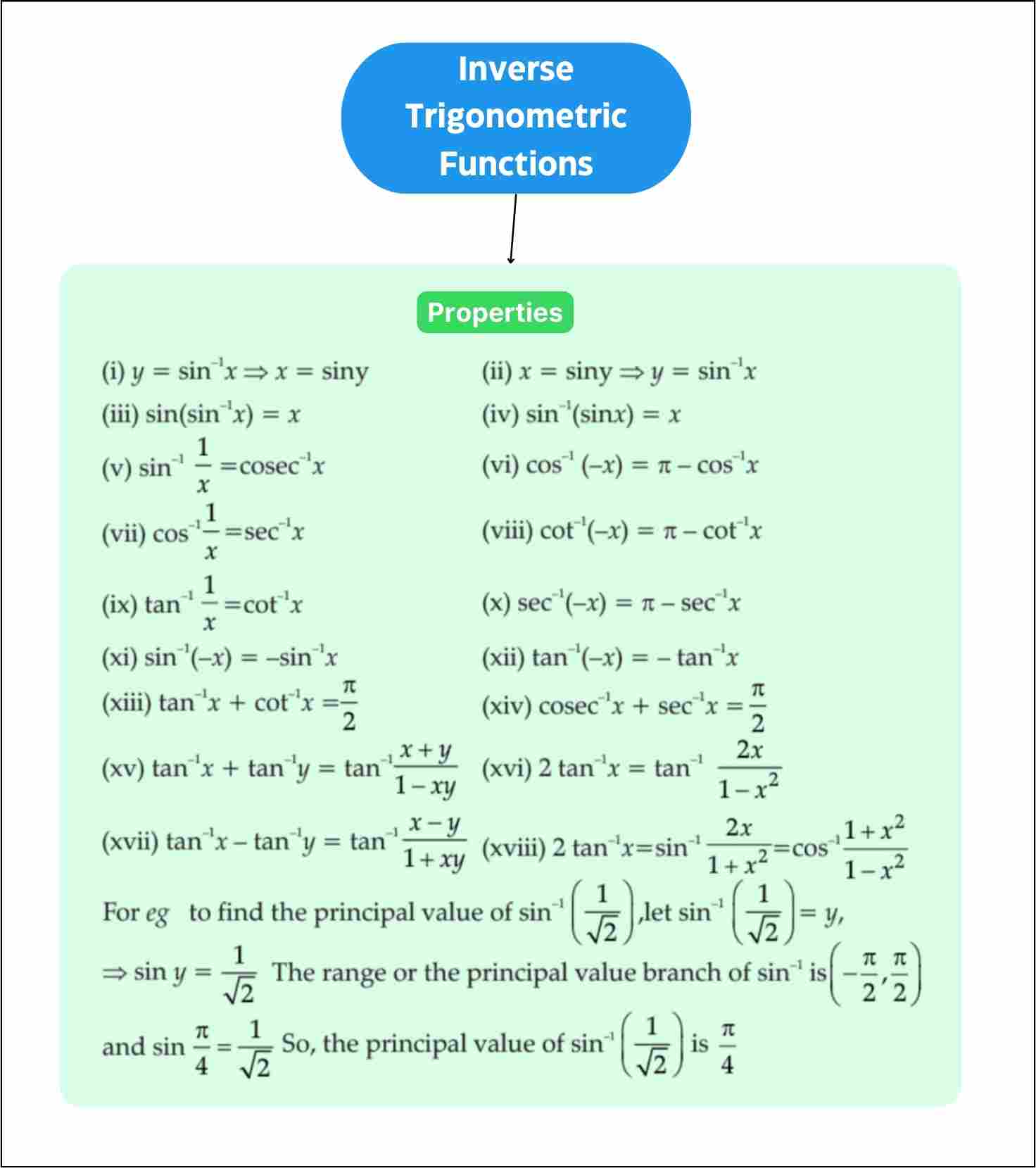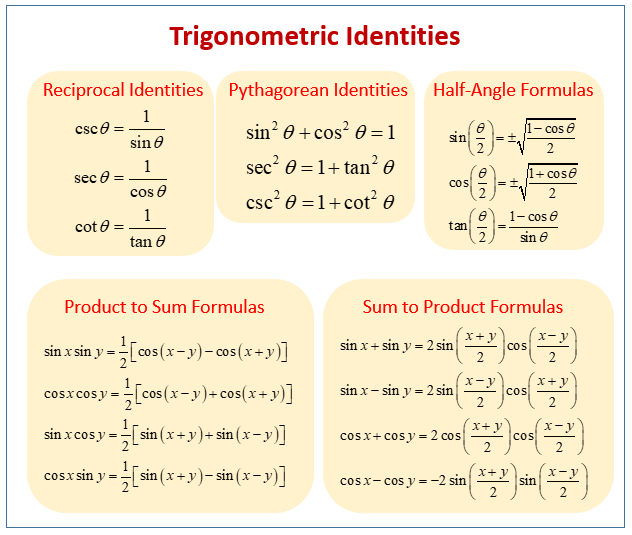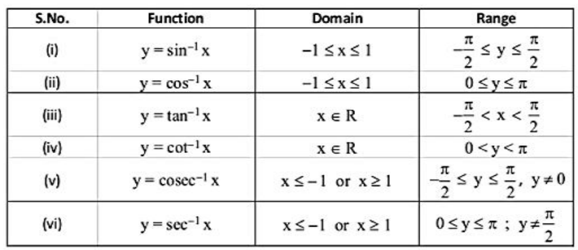
HEADLINES / Today / November 3, 2024
Inverse Trigonometry Function Lec 11 Identities Of Addition
Addition Properties of Inverse Trigonometric Functions - Cuemath: Addition Properties Of Inverse Trigonometric Functions in Trigonometry with concepts, examples and solutions. FREE Cuemath material for JEE,CBSE, ICSE for excellent results!. The sum and difference of inverse trigonometric functions ... - MATHVOX: The difference of arcsines. Proof of the formula for the sum and difference of arcsines. Step 1. To prove the formula for the sum of arcsines, let’s introduce new notations: and: According to the new notations: For any values of x and y, arcsin d will belong to the interval [−π/2; π/2].

CBSE Inverse Trigonometric Functions Class 12 Mind Map For Chapter 2 Of ...
Step 2.. Inverse trigonometric functions - Wikipedia: The following table shows how inverse trigonometric functions may be used to solve equalities involving the six standard trigonometric functions. It is assumed that the given values θ , {\displaystyle \theta ,} r , {\displaystyle r,} s , {\displaystyle s,} x , {\displaystyle x,} and y {\displaystyle y} all lie within appropriate ranges so that the relevant expressions below are well-defined .. Inverse Trigonometric Identities | Brilliant Math & Science Wiki: The following inverse trigonometric identities give an angle in different ratios.

Trigonometric Functions (examples, Videos, Worksheets, Solutions ...
Before the more complicated identities come some seemingly obvious ones. Be observant of the conditions the identities call for. Now for the more complicated identities. These come handy very often, and can easily be derived using the basic trigonometric identities.. 6.3: Inverse Trigonometric Functions - Mathematics LibreTexts: In other words, the domain of the inverse function is the range of the original function, and vice versa, as summarized in Figure 6.3.1. Figure 6.3.1. For example, if f(x) = sin x, then we would write f − 1(x) = sin − 1x.

Inverse Trigonometric Values
Be aware that sin − 1x does not mean 1 sin x. The following examples illustrate the inverse trigonometric functions:. Identities with Inverse Trig Functions - University of California, Berkeley: Summary. Review: \Inverse" trig functions. Identies: Compositions of sin( ) and sin. 1(y). Example: Inverting functions with terms from trig Trig Identities: Right angle Identities Trig Identities: Even and Oddness.. Inverse Trigonometric Functions - Formulas, Graph, Domain & Range - Cuemath: Inverse trigonometric functions are the inverse functions of the basic trigonometric functions which are sine, cosine, tangent, cotangent, secant, and cosecant functions.

How To Calculate Inverse Trig
Some basic inverse trigonometric formulas are as given below, sin -1 (-x) = -sin -1 x. tan -1 (-x) = -tan -1 x. cosec -1 (-x) = -cosec -1 x.. 8.2 Inverse Trigonometric Functions – Trigonometry: The inverse sine function. The function f(x) = sin − 1x is defined as follows: sin − 1x = θ ifandonlyif sinθ = x and − π 2 ≤ θ ≤ π 2. In other words, sin − 1x is the angle in radians, between − π 2 and π 2, whose sine is x. There are many angles with a given sine value x, but only one of these angles can be sin − 1x..

Trigonometry Formulas With Examples
Identities with Inverse Trig Functions - University of California, Berkeley
Summary. Review: \Inverse" trig functions. Identies: Compositions of sin( ) and sin. 1(y). Example: Inverting functions with terms from trig Trig Identities: Right angle Identities Trig Identities: Even and Oddness.
Addition Properties of Inverse Trigonometric Functions - Cuemath
Addition Properties Of Inverse Trigonometric Functions in Trigonometry with concepts, examples and solutions. FREE Cuemath material for JEE,CBSE, ICSE for excellent results!
8.2 Inverse Trigonometric Functions – Trigonometry
The inverse sine function. The function f(x) = sin − 1x is defined as follows: sin − 1x = θ ifandonlyif sinθ = x and − π 2 ≤ θ ≤ π 2. In other words, sin − 1x is the angle in radians, between − π 2 and π 2, whose sine is x. There are many angles with a given sine value x, but only one of these angles can be sin − 1x.
The sum and difference of inverse trigonometric functions ... - MATHVOX
The difference of arcsines. Proof of the formula for the sum and difference of arcsines. Step 1. To prove the formula for the sum of arcsines, let’s introduce new notations: and: According to the new notations: For any values of x and y, arcsin d will belong to the interval [−π/2; π/2]. Step 2.
Inverse Trigonometric Functions - Formulas, Graph, Domain & Range - Cuemath
Inverse trigonometric functions are the inverse functions of the basic trigonometric functions which are sine, cosine, tangent, cotangent, secant, and cosecant functions. Some basic inverse trigonometric formulas are as given below, sin -1 (-x) = -sin -1 x. tan -1 (-x) = -tan -1 x. cosec -1 (-x) = -cosec -1 x.
Inverse Trigonometric Identities | Brilliant Math & Science Wiki
The following inverse trigonometric identities give an angle in different ratios. Before the more complicated identities come some seemingly obvious ones. Be observant of the conditions the identities call for. Now for the more complicated identities. These come handy very often, and can easily be derived using the basic trigonometric identities.
Inverse trigonometric functions - Wikipedia
The following table shows how inverse trigonometric functions may be used to solve equalities involving the six standard trigonometric functions. It is assumed that the given values θ , {\displaystyle \theta ,} r , {\displaystyle r,} s , {\displaystyle s,} x , {\displaystyle x,} and y {\displaystyle y} all lie within appropriate ranges so that the relevant expressions below are well-defined .
6.3: Inverse Trigonometric Functions - Mathematics LibreTexts
In other words, the domain of the inverse function is the range of the original function, and vice versa, as summarized in Figure 6.3.1. Figure 6.3.1. For example, if f(x) = sin x, then we would write f − 1(x) = sin − 1x. Be aware that sin − 1x does not mean 1 sin x. The following examples illustrate the inverse trigonometric functions:
Related for Inverse Trigonometry Function Lec 11 Identities Of Addition
It is a capital mistake to theorize before one has data. Insensibly one begins to twist facts to suit theories, instead of theories to suit facts.
Keep Yourself Updated By Following Our Stories From The Whole World
Keep yourself updated with the latest stories from across the globe! Our platform brings you real-time insights and breaking news, covering everything from major world events to inspiring local stories. By following our stories, you’ll stay informed on a diverse range of topics and perspectives from around the world. Whether it’s political shifts, cultural milestones, or groundbreaking innovations, we ensure you’re always connected to what matters most. Dive into our global coverage and stay informed, no matter where you are!



